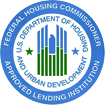The differences between a conforming and non-conforming loan can be said in this way, Conforming loans meet Fannie Mae and Freddie Mac guidelines, whereas nonconforming loans do not. A conforming loan comes up with a lower interest rate and lowers fees. Lenders always like to select them, because they can sell the loans that don’t need capital, allows them to make more loans.
When assessing home loan categories, many people get confused by the terms conventional and conforming. While these two terms sound similar, their definitions are quite different. Thus, it’s important to know the distinctions.

Difference Between Conforming and Nonconforming Loans
What Is a Conforming Loan?
A conforming mortgage loan must meet the specific criteria that let Fannie Mae and Freddie Mac purchase the loan. The key is the loan limit and the maximum amount of the loan that Fannie Mae or Freddie Mac will buy. The loan limit can change every year. Recently, the Federal Housing Finance Agency (FHFA) has increased the conforming loan limit for a single-family.
Benefits of a Conforming Loan
The main advantage of a conforming loan is that borrowers who carry an extraordinary credit will get lower interest rates. This means lower monthly mortgage payments and less money spent over the life of the loan.
What is a Non-Conforming Loan?
Non-conforming loans will not be available through Fannie Mae or Freddie Mac. These loans include jumbo loans that exceed the conforming loan limits and hold different guidelines. Because of the higher risk of jumbo loans, they hold less-favorable terms and are not easy to sell on the secondary market.
Benefits of a Non-Conforming loan
Non-conforming loans allow people to borrow larger amounts when compared to conforming loan. A jumbo loan includes any loans above the conforming limit. But, in areas with high demand, the conforming limits are much higher. Jumbo loans are targeted toward high-income earners who have good credit and plentiful assets. Because of the size of the loan, lenders assume greater risk with these mortgages. To reduce the risk many lenders need borrowers to place a down payment or mortgage payments in an asset account as an extra security. The risk to the lender is also offset through higher interest rates and stern requirements.
It’s crucial to follow some best practices like comparing shop lenders to know different programs, rates, and fees to confirm the lenders’ quality. However, the loan amount, and your financial condition, and different factors indicate which loan type you qualify for.
If you miss out on conforming mortgage, you might be looking for an FHA loan. The Federal Housing Administration assists homeowners to qualify for a mortgage by assuring a portion of the loan. The thing with this type of loan is it will cost you additional fees.



